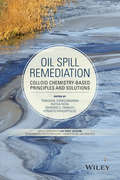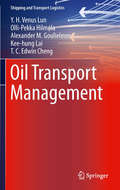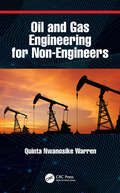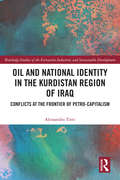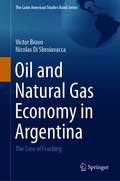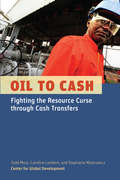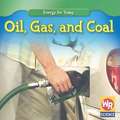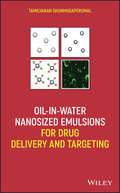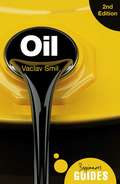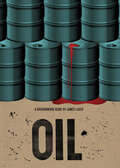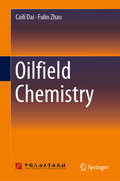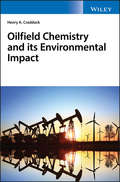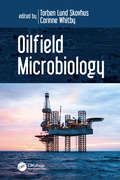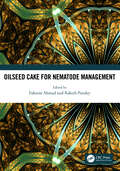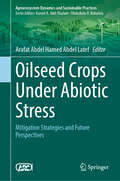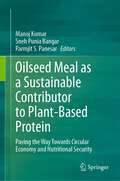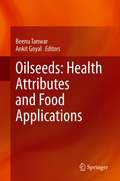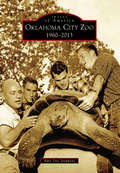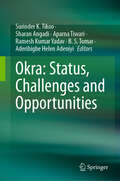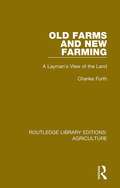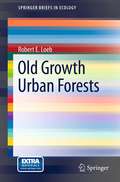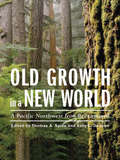- Table View
- List View
Oil Spill Remediation
by Ponisseril Somasundaran Kyriakos Papadopoulos Partha Patra Raymond S. FarinatoThis book provides a comprehensive overview of oil spill remediation from the perspectives of policy makers, scientists, and engineers, generally focusing on colloid chemistry phenomena and solutions involved in oil spills and their cleanup.* First book to address oil spill remediation from the perspective of physicochemical and colloidal science* Discusses current and emerging detergents used in clean-ups* Includes chapters from leading scientists, researchers, engineers, and policy makers* Presents new insights into the possible impact of oil spills on ecosystems as well as preventive measures
Oil Transport Management
by Kee-Hung Lai Alexander M. Goulielmos T.C. Edwin Cheng Olli-Pekka Hilmola Y.H. Venus LunThe first volume in a new Springer Series on Shipping and Transport Logistics, Oil Transport Management provides a full historical account of the evolution of the oil transport industry since the 1800's. In this comprehensive guide, the authors investigate the industry and describe the shipping market and its structure, as well as forecasting, location plan and the transportation chain. They dedicate a separate chapter to each topic to cover various concepts, including: an introduction to the tanker shipping market, including how the freight, new vessel building, second hand and demolition markets influence one another, the economic structure and organization of the tanker industry in both the past and present, and forecasting the need for oil-based sea transportation. Further chapters present case studies and simulations to illustrate the importance of factory location decisions and the need for oil infrastructure investments. Chapter One also includes a regression equation to predict the fleet size in tanker shipping. Oil Transport Management is a key reference, which can be practically applied to wider global research and practices. Ideal for both industry practitioners, and researchers and students of shipping studies, Oil Transport Management provides a concise yet comprehensive coverage of the oil transport industry's history and a guide for its future development.
Oil and Gas Engineering for Non-Engineers
by Quinta Nwanosike WarrenOil and Gas Engineering for Non-Engineers explains in non-technical terms how oil and gas exploration and production are carried out in the upstream oil and gas industry. The aim is to help readers with no prior knowledge of the oil and gas industry obtain a working understanding of the field. Focuses on just the basics of what the layperson needs to know to understand the industry Uses non-technical terms, simple explanations, and illustrations to describe the inner workings of the field Explains how oil is detected underground, how well locations are determined, how drilling is done, and how wells are monitored during production Describes how and why oil and gas are separated from impurities before being sent to customers Aimed at non-engineers working within the oil and gas sector, this book helps readers get comfortable with the workings of this advanced field without the need for an advanced degree in the subject.
Oil and National Identity in the Kurdistan Region of Iraq: Conflicts at the Frontier of Petro-Capitalism (Routledge Studies of the Extractive Industries and Sustainable Development)
by Alessandro TintiExamining the interplay between the oil economy and identity politics using the Kurdistan Region of Iraq as a case study, this book tells the untold story of how extractivism in the Kurdish autonomous region is interwoven in a mosaic of territorial disputes, simmering ethnic tensions, dynastic rule, party allegiances, crony patronage, and divergent visions about nature. Since the ousting of Saddam Hussein, the de-facto borders of the Kurdistan Region of Iraq have repeatedly changed, with energy interests playing a major role in such processes of territorialisation. However, relatively little research exists on the topic. This book provides a timely, empirical analysis of the intersections between extractive industries, oil imaginaries, and identity formation in one of the most coveted energy frontiers worldwide. It shines a light on relations between the global production networks of petro-capitalism and extractive localities. Besides the strained federal relationship with the Iraqi central government, the transformative effects the petroleum industry has had on Kurdish society are also explored in depth. Moreover, the book fills a gap in the literature on Kurdish Studies, which has devoted scant attention to energy-related issues in the re-imagination of Kurdish self-determination. This book will be of great interest to students and scholars of the extractive industries, energy studies, conflict studies, Middle Eastern politics, and political ecology.
Oil and Natural Gas Economy in Argentina: The case of Fracking (The Latin American Studies Book Series)
by Victor Bravo Nicolas Di SbroiavaccaThis book gathers four papers authored by Víctor Bravo and Nicolás Di Sbroiavacca, Oil and Natural Gas Engineers, specialized in Energy Economics. The main axis of the book is the application of the exploitation techniques of Oil and Natural Gas in Argentina, by the so-called “conventional” methods, in comparison with the so-called “Fracking”,(name massively used in the First World and particularly in the United States of America). Argentina has important Oil and Natural Gas resources in different regions of its wide geography. To develop these “non-conventional” techniques has generated endless controversies all over the world, mostly due to its estimated environmental impact and the need of significant requirement of large capitals for investment.Argentina is not out of this relevant controversy because in the mind of the maximum national authorities, fracking is one of the main factors that may contribute to generate monetary funds devoted to the payment of the immense foreign debt of this country. Other authors estimate that it is not possible to develop our country just on the basis of the massive exploitation and boundless export of natural resources. Consequently, fracking is undoubtedly a topic of National Energy Politics.In this scenario, a previous analysis of the National Energy Politics of the recent governments of Argentina, after the bloody military dictatorship of 1976-1983 and the return to democratic governments in December 1983. This analysis is done over the chapters “Analysis of the National Law Nº 27007 (known as the “Hydrocarbon Resources Law”) and the Oil and Natural Gas politics”, the “Oil and Natural Gas Politics of the period from 2003 to 2014” and “The Argentine Energy Politics during the 2014-2018 period”. Later on, the “Fracking” case is fully developed with two complementary analyses. One of them is basically centered on the technical and prospective scenarios for “fracking”: ”Shale Oil and Shale Gas in Argentina: Situation and Perspectives”. The other one, ”A technical opinion about Fracking”, contemplates the impacts resulting from the use of these techniques, especially those concerning the environment. Anyhow, each of the chapters are self-contained, thus permitting separate reading of any of them.
Oil to Cash: Fighting the Resource Curse Through Cash Transfers
by Caroline Lambert Todd Moss Stephanie MajerowiczWhat should a country do if it suddenly discovers oil and gas? How should it spend the subsequent cash windfall? How can it protect against corruption? How can citizens truly benefit from national wealth? With many of the world's poorest and most fragile states suddenly joining the ranks of oil and gas producers, these are pressing policy questions. Oil to Cash explores one option that may help avoid the so-called resource curse: just give the money directly to citizens. A universal, transparent, and regular cash transfer would not only provide a concrete benefit to regular people, but would also create powerful incentives for citizens to hold their government accountable. Oil to Cash details how and where this idea could work and how policymakers can learn from the experiences with cash transfers in places like Mexico, Mongolia, and Alaska.
Oil, Gas, and Coal
by Tea BenduhnOur lives would be very different without oil, gas, and coal. These fossil fuels help heat our homes, turn on our lights, and power our cars and trucks. But they also damage our environment-and they won't last forever. Learn how we use these energy sources today and find out how we might use them with cleaner sources of energy in the future.
Oil-in-Water Nanosized Emulsions for Drug Delivery and Targeting
by Tamilvanan ShunmugaperumalThis book combines emulsion knowledge into a single, comprehensive volume, ideal for professionals and students involved in the areas of pharmaceutical science who are looking to learn about this emergent research concept. Compiles the step-by-step investigations made concerning the potential of nanosized emulsions on both drug delivery and drug targeting areas by different group of scientists in various laboratories across the world Inverts the common nano-emulsions coverage trend of focusing on focused on the particulate system itself, instead exploring the way to turn nanosized emulsions as biomedical tool, as well as, treating the in vitro and in vivo aspects after administration Provides an overview of the current state-of-the art regarding the development of tocol emulsions, emulsion adjuvants in immunization research, oxygen-carrying emulsions (called as fluorocarbon emulsion) and emulsions for delivering drugs to nasal and topical (ocular and transdermal) routes
Oil: A Beginner's Guide (Beginner's Guides)
by Vaclav SmilWorld acclaimed scientist Vaclav Smil reveals everything there is to know about nature's most sought-after resourceOil is the lifeblood of the modern world. Without it, there would be no planes, no plastic, no exotic produce, and a global political landscape few would recognise. Humanity&’s dependence upon oil looks set to continue for decades to come, but what is it? Fully updated and packed with fascinating facts to fuel dinner party debate, Professor Vaclav Smil's Oil: A Beginner's Guide explains all matters related to the &‘black stuff&’, from its discovery in the earth right through to the controversy that surrounds it today.
Oil: A Groundwork Guide (Groundwork Guides)
by James LaxerThis book explores today’s global dependency on oil and reveals the sobering realities of the relationship between oil, politics and money. An excellent introduction for young adults.Oil, our main source of energy, underlies the world's economy. In the twentieth century its availability and relatively low price allowed for the industrial growth and development of the world's leading economies. The new rapidly developing giants, India and China, want access to the same possibilities. But today we know that cheap, easily accessible oil supplies are dwindling, and we are beginning to recognize the true cost to the world's environment of our profligate use of this form of energy.As Oil shows, a substantial portion of the world's remaining supply lies in countries whose interests are not identical with those of the major industrial powers."[The Groundwork Guides] are excellent books, mandatory for school libraries and the increasing body of young people prepared to take ownership of the situations and problems previous generations have left them." -- Globe and Mail
Oilfield Chemistry
by Caili Dai Fulin ZhaoThis book provides comprehensive information on the youngest member of the petroleum sciences family: Oilfield Chemistry, proposes the chemical agents for addressing current problems, and explains the functions, mechanisms and synergistic effects of various chemical agents
Oilfield Chemistry and its Environmental Impact
by Henry A. CraddockConsolidates the many different chemistries being employed to provide environmentally acceptable products through the upstream oil and gas industry This book discusses the development and application of green chemistry in the oil and gas exploration and production industry over the last 25 years — bringing together the various chemistries that are utilised for creating suitable environmental products. Written by a highly respected consultant to the oil and gas industry — it introduces readers to the principles and development of green chemistry in general, and the regulatory framework specific to the oil and gas sector in the North Sea area and elsewhere in the world. It also explores economic drivers pertaining to the application of green chemistry in the sector. Topics covered in Oilfield Chemistry and its Environmental Impact include polymer chemistry, surfactants and amphiphiles, phosphorus chemistry, inorganic salts, low molecular weight organics, silicon chemistry and green solvents. It also looks at sustainability in an extractive industry, examining the approaches used and the other methodologies that could be applied in the development of better chemistries, along with discussions about where the application of green chemistry is leading in this industry sector. Provides the reader with a ready source of reference when considering what chemistries are appropriate for application to oilfield problems and looking for green chemistry solutions Brings together the pertinent regulations which workers in the field will find useful, alongside the chemistries which meet the regulatory requirements Written by a well-known specialist with a combined knowledge of chemistry, manufacturing procedures and environmental issues Oilfield Chemistry and its Environmental Impact is an excellent book for oil and gas industry professionals as well as scientists, academic researchers, students and policy makers.
Oilfield Microbiology: Proceedings From The International Symposium On Applied Microbiology And Molecular Biology In Oil Systems (ismos-2) 2009
by Torben Lund Skovhus Corinne WhitbyMicroorganisms can be both beneficial and harmful to the oil and gas industry and therefore there is an increasing need for the oil industry to characterize, quantify and monitor microbial communities in real time. Oilfield Microbiology offers a fundamental insight into how molecular microbiological methods have enabled researchers in the field to analyze and quantify in situ microbial communities and their activities in response to changing environmental conditions. Such information is fundamental to the oil industry to employ more directed, cost-effective strategies to prevent the major problems associated with deleterious microbial activities (e.g., souring and biocorrosion), as well as to encourage beneficial microbe activity (e.g. oil bioremediation). The aim of the book is to understand how the technological advances in molecular microbiological methods over the last two decades are now being utilized by the oil industry to address the key issues faced by the sector. This book contains a comprehensive collection of chapters written by invited experts in the field from academia and industry and provides a solid foundation of the importance of microbes to the oil and gas industry. It is aimed at microbial ecologists, molecular biologists, operators, engineers, chemists, and academics involved in the sector.
Oilseed Cake for Nematode Management
by Faheem Ahmad Rakesh PandeyPlant-parasitic nematodes (PPNs) devastate many crop plants, causing billions of dollars in agricultural losses each year. Effective management methods to combat PPNs are synthetic nematicides, but most are non-specific and notoriously toxic and threaten the soil ecosystem, groundwater and human health. The plant by-products, such as oilseed cakes, are sources of bioactive compounds with nematicidal potential. Oilseed cakes are an excellent organic fertilizer, and their bioactive compounds are now gaining importance as they are safe for the environment. This book provides the most comprehensive and up-to-date review of research on the use of oilseed cakes against PPNs. The complete knowledge of better uses of oilseed cakes for nematode management is necessary for developing effective nematode control options to reduce yield loss. Key features: • Describes plant by-products such as oilseed cakes and their potential applications • Explores bioactive compounds from oilseed cakes for agricultural biofertilization and nematicidal activity • Discusses nematode management in vegetable, fruit and legume crops • Covers the use of oilseed cakes and management of the associated challenges This volume is designed and edited to serve as an invaluable resource text for readers associated with plant nematology, plant pathology, plant protection and agricultural science, including researchers, teachers, advanced undergraduates and graduate students and even agricultural extension agents and farmers.
Oilseed Crops Under Abiotic Stress: Mitigation Strategies and Future Perspectives (Sustainability Sciences in Asia and Africa)
by Arafat Abdel Hamed Abdel LatefThis book discusses the physiological, biochemical, and molecular strategies employed by oilseed crops to alleviate the effects of abiotic stress. It also covers the positive role of exogenous stimulants in enhancing oilseed crop production under these conditions. Strategies for improving tolerance in oilseed crops to various abiotic stressors, including salinity, drought, waterlogging, flooding, extreme temperatures, nutrient deficiency, heavy metal toxicity, and UV radiation, are discussed in detail. Additionally, the book includes a section on omics approaches and nanotechnological strategies for building resilience. Focusing on oilseed crops under abiotic stress, this book provides new and updated information for plant scientists, researchers, and scholars. Covering various stress-related topics, it is a unique and valuable resource.
Oilseed Meal as a Sustainable Contributor to Plant-Based Protein: Paving the Way Towards Circular Economy and Nutritional Security
by Manoj Kumar Parmjit S. Panesar Sneh Punia BangarProtein is one of the most important ingredients of the human diet and is considered crucial for the growth development of all age groups. Studies have set the recommended dietary allowance of protein as 0.8 g/kg body weight per day for healthy adults. The world population is projected to reach 10 billion by 2050 and it will be a significant challenge for the scientific community to overcome the growing demand for protein. The results of global warming, from shifting climactic conditions to unpredictable rainfalls, have further complicated the situation. The search for alternative protein sources that can be both sustainable and renewable is one of the major challenges in the face of potential mass protein malnutrition. Oilseed crops such as soybean, mustard, oil palm, peanuts, cottonseed, flax seed, coconut, canola and sesame are mainly cultivated for the extraction of cooking oil and are underutilized as sources of protein. Oilseed meals contain as much as 50% protein but remain under-valued since they are traditionally utilized as fertilizer or as feed for livestock animals. Numerous recent studies show that oilseed meal sources can be utilized as a sustainable and renewable source of protein and could play a major role in alleviating the global problem of protein malnutrition. Oilseed Meal as Sustainable Contributor to Plant-Based Protein explores oilseed crops that can contribute towards the regular supply of protein in an increasing population and changing climate. Each chapter focuses on a specific oilseed crop including comprehensive coverage of the processing and extraction specifics for each crop plus their amino acid profiles and other functional properties. The application of oilseed proteins for production of bioactive peptides and preparation of value-added products is also covered. This text is useful for food scientists and researchers seeking an updated single source for coverage on all the most important oilseed crops andtheir potential roles in combating protein shortages in a growing world population.
Oilseeds: Health Attributes and Food Applications
by Beenu Tanwar Ankit GoyalOilseeds offer a plethora of opportunities for the food and feed industry, thanks to their high oil and protein content . Their phytonutrients and functional components have attracted the interest of researchers, leading to the development of functional foods. This book gathers the latest scientific information on the nutrients, phytonutrients and health benefits as well as the adverse effects of consuming various conventional and non-conventional oilseeds. In addition, each chapter includes a section comprehensively explaining the use of oilseeds in functional bakery, dairy, and other food products. Given its scope, the book is a valuable resource for students, researchers, nutritionists, food scientists and technologists, and for anyone involved in product development based on oilseed and its components.
Oklahoma City Zoo: 1960-2013
by Amy Dee StephensWhat started as a small menagerie in 1902 officially became Oklahoma City Zoo in 1903. Journey through the second half century of its illustrious history in Oklahoma City Zoo: 1960-2013. Meet the staff and animals and explore the exhibits that propelled it from a third-class animal facility to one of the best zoos in the United States. In the 1960s, its animal population exploded as knowledge of animal care improved. The zoo soon assembled the largest-known collection of hoofed animals. Later, a rare mountain gorilla named M'Kubwa stole newspaper headlines, a third leopard escaped, and the zoo met its first cheetah babies. The opening of Aquaticus in the 1980s "brought the ocean to the prairie" in the form of a dolphin and sea lion show. Elephants, however, remain the queen attraction at the Oklahoma City Zoo. In 2011, the birth of the zoo's first baby elephant baby, Malee, was a crowning achievement in its 110-year history.
Oklahoma Integrated Science (Grade #7)
by Mcdougal LittellMcDougal Littell Science pulls together units from the different categories of science to give you a broad picture of how scientists study nature.
Okra: Status, Challenges and Opportunities
by Aparna Tiwari Surinder K. Tikoo B. S. Tomar Sharan Angadi Ramesh Kumar Yadav Aderibigbe Helen AdeniyiThis edited book covers all aspects of Okra and its global status. It includes general characteristics, classification, and description of various domains affecting crop improvement, such as the latest trends in breeding, genomics and molecular marker development, biotic and abiotic stress, nutritional quality aspects, seed production, and the export and market expansion scenario of Okra. Okra (Abelmoschus esculentus L. Moench) is an important vegetable crop grown throughout the tropical and subtropical regions of the world. In the last five years, okra has gained recognition as a global crop due to its nutritional values being recognized by consumers. The global seed requirement is expected to reach 6000 MT by 2030, making it a $300 million crop soon. This book compiles extensive knowledge on various aspects of okra, such as crop improvement, agronomy, seed production, and global market status, under the aegis of Foundation for Advanced Training in Plant Breeding (ATPBR). This book is designed for breeders, pathologists, biotechnologists, seed production specialists, market managers, graduate and post-graduate students, and other stakeholders associated with okra crop improvement or market development from both the public and private sectors. It serves as an excellent guide for crop scientists and students working on okra around the globe, helping to generate ideas for formulating public-private collaborative research for future innovation in the crop.
Old Earth or Evolutionary Creation?: Discussing Origins with Reasons to Believe and BioLogos (BioLogos Books on Science and Christianity)
by J. B. Stump Kenneth Keathley Joe AguirrehowOld Earth or Evolutionary Creation?
Old Farms and New Farming: A Layman's View of the Land (Routledge Library Editions: Agriculture #14)
by Charles FurthFirst published in 1975. This title presents a series of vivid insights and images, explaining the problems in the field, the machinery and techniques, science and economics, and what it means to the farm worker. The book depicts and explains the sophisticated techniques with which the farmer tackles the problems of soil and season, within the beautiful and ancient rhythm of lambing and haymaking, pasture and dairy, seed time and harvest. This title will be of great interest to not only students of agriculture, but those interested in the history of farming.
Old Fields: Dynamics and Restoration of Abandoned Farmland (Science Practice Ecological Restoration)
by Richard J. Hobbs Viki A. CramerLand abandonment is increasing as human influence on the globe intensifies and various ecological, social, and economic factors conspire to force the cessation of agriculture and other forms of land management. The "old fields" that result from abandonment have been the subject of much study, yet few attempts have been made to examine the larger questions raised by old field dynamics. Old Fields brings together leading experts from around the world to synthesize past and current work on old fields, providing an up-to-date perspective on the ecological dynamics of abandoned land. The book gives readers a broad understanding of why agricultural land is abandoned, the factors that determine the ecological recovery of old fields, and how this understanding contributes to theoretical and applied ecology. Twelve case studies from diverse geographical and climatic areas--including Australian rainforest, Brazilian Amazonia, New Jersey piedmont, and South African renosterveld--offer a global perspective on the causes and results of land abandonment. Concluding chapters consider the similarities and differences among the case studies, examine them in the context of ecological concepts, and discuss their relevance to the growing field of restoration ecology. Old Fields is the first book to draw together studies on old fields from both a theoretical and practical perspective. It represents an important contribution to the development of theory on old field dynamics and the practice of ecological restoration on abandoned farmland, and the broader implications of old field dynamics to ecology and restoration.
Old Growth Urban Forests
by Robert E. LoebMillions of urbanites never see primeval forests during their lives except for the old growth forests found in urban parks. Unfortunately, these forests are on the verge of disappearing because arboreal reproduction is lost to human trampling and park administrators and urban foresters do not maintain these "natural" forests. To aid urban foresters and park managers in meeting the challenges, research on old growth forests in urban parks is synthesized in terms of historical ecology to introduce the methods utilized to reveal long-term forest composition changes. The case study of three stands in Fairmount Park, Philadelphia, PA relates pre-chestnut blight tree species densities and post-chestnut blight arboreal changes to fire and visitor trampling. The information gained on how urban old growth forests have developed and changed is used to develop restoration ecology based frameworks to restore species composition and address challenges to forest survival including invasive species.
Old Growth in a New World: A Pacific Northwest Icon Reexamined
by Sally L. Duncan Thomas A. SpiesOld-growth forests represent a lofty ideal as much as an ecosystem--an icon of unspoiled nature, ecological stability, and pristine habitat. These iconic notions have actively altered the way society relates to old-growth forests, catalyzing major changes in policy and management. But how appropriate are those changes and how well do they really serve in reaching conservation goals? Old Growth in a New World untangles the complexities of the old growth concept and the parallel complexity of old-growth policy and management. It brings together more than two dozen contributors--ecologists, economists, sociologists, managers, historians, silviculturists, environmentalists, timber producers, and philosophers--to offer a broad suite of perspectives on changes that have occurred in the valuing and management of old-growth forests in the Pacific Northwest over the past thirty years. The book * introduces the issues and history of old-growth values and conservation in the Pacific Northwest; * explores old growth through the ideas of leading ecologists and social scientists; * addresses the implications for the future management of old-growth forests and considers how evolving science and social knowledge might be used to increase conservation effectiveness. By confronting the complexity of the old-growth concept and associated policy and management challenges, Old Growth in a New World encourages productive discussion on the future of old growth in the Pacific Northwest and offers options for more effective approaches to conserving forest biodiversity.
